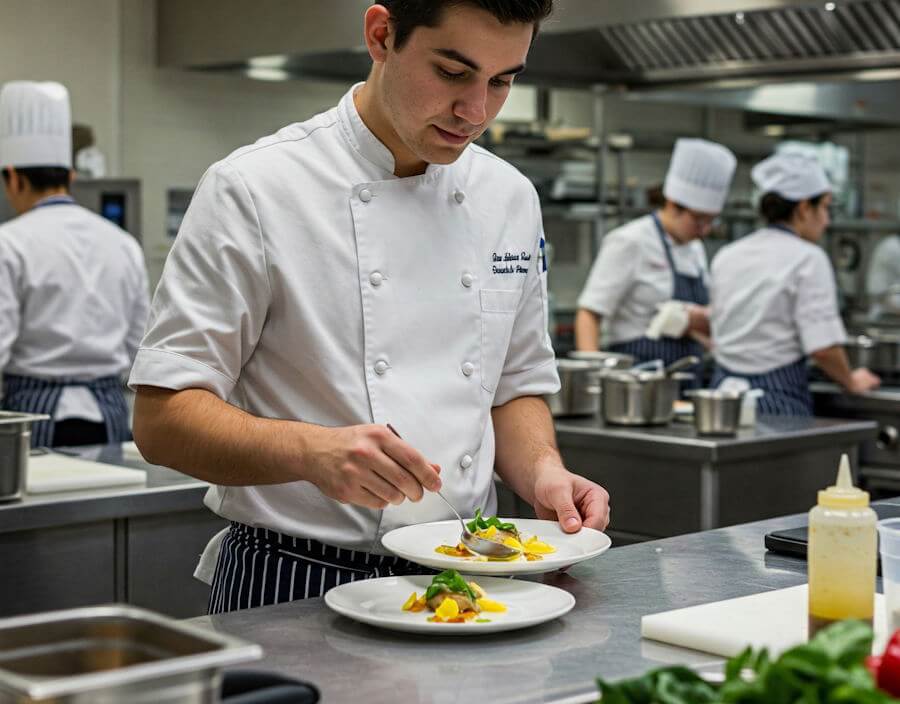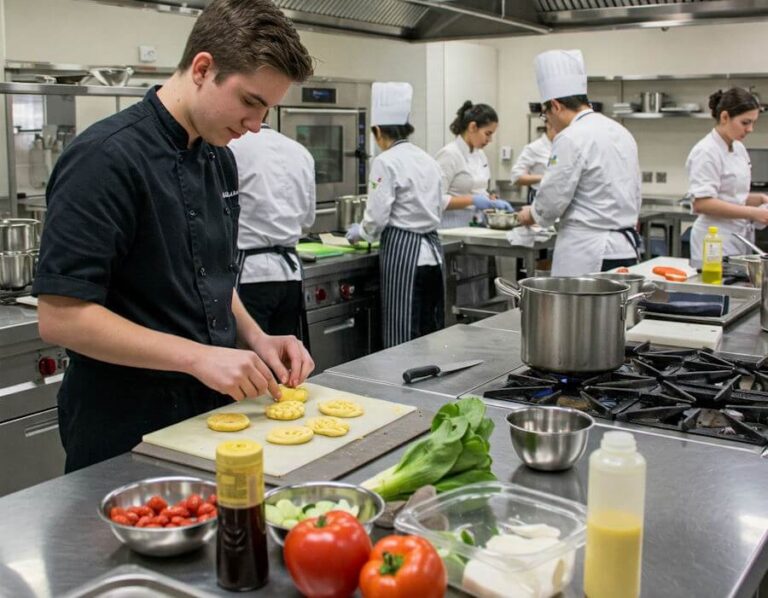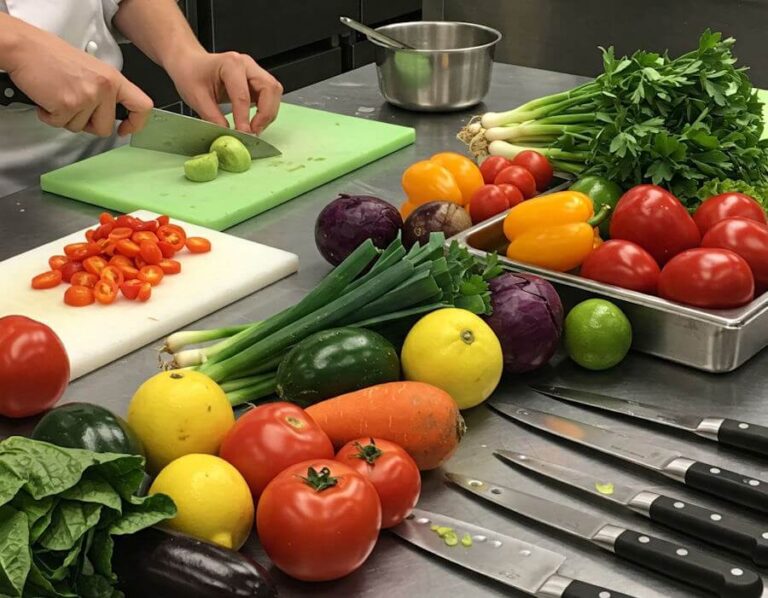Culinary internships represent a crucial component in the journey of aspiring chefs, serving as a bridge between theoretical knowledge acquired in culinary schools and the practical skills necessary for successful careers in the culinary arts. These internships typically involve hands-on training in various culinary environments, such as restaurants, hotels, or catering companies, allowing individuals to gain insight into the fast-paced world of professional cooking. Through a culinary internship, students can effectively apply the principles they have learned in the classroom to real-world scenarios, thereby enhancing their culinary skills and confidence.
The significance of culinary internships extends beyond mere skill development. They offer aspiring chefs an invaluable opportunity to network with industry professionals, fostering relationships that may lead to future job opportunities. Many culinary programs encourage or even require internships as part of their curriculum, emphasizing their importance in shaping the careers of future chefs. By participating in internships, individuals can gain exposure to different culinary styles, kitchen operations, and team dynamics that are often not fully experienced in a classroom setting.
Furthermore, culinary internships help students understand the nuances of workplace expectations, such as time management, communication, and teamwork. These experiences not only allow interns to refine their cooking abilities but also impart essential interpersonal skills that are critical in the culinary field. Employers often seek candidates who have completed internships, as they demonstrate a commitment to the profession and an eagerness to learn from experts in the industry. Overall, culinary internships serve as an essential stepping stone for anyone looking to establish a fulfilling career as a chef.
Gaining Practical Experience
Culinary internships serve as a fundamental stepping stone for aspiring chefs, providing invaluable hands-on experience that can significantly influence their future in the culinary industry. During these internships, culinary students have the opportunity to apply theoretical knowledge gained through formal education in a real-world kitchen environment. This practical application of skills not only reinforces what they have learned but also allows them to develop a deeper understanding of various culinary techniques and procedures.
Interns are often engaged in diverse kitchen operations, from food preparation to plating and presentation. Working alongside professional chefs, they gain insights into the nuances of culinary artistry, learning how to execute recipes reliably and efficiently. This mentorship is crucial, as seasoned chefs impart their wisdom on everything from kitchen etiquette to the importance of timing and teamwork in a busy kitchen setting. Such interactions help interns to cultivate their culinary skills while fostering a unique perspective on professional kitchen dynamics.
Moreover, culinary internships expose interns to the day-to-day operations of a kitchen. Interns learn about inventory management, food safety standards, and the vital role of communication within a culinary team. This experience is essential, as it equips them with the practical knowledge required to thrive in fast-paced culinary environments. They also gain familiarity with commercial kitchen equipment and techniques, further enhancing their skill set.
Overall, the immersive nature of culinary internships allows aspiring chefs to build confidence in their abilities while simultaneously expanding their professional networks. This combination of practical experience and industry connections positions them for success as they transition from a learning environment to a professional career in cooking. Ultimately, such internships play a pivotal role in shaping the future of those who aspire to excel in the culinary arts.
Building Professional Networks
In the culinary industry, networking plays a crucial role in shaping a successful career as a chef. Internships serve as a vital platform for aspiring chefs to establish professional connections that can significantly influence their future. During these internships, individuals have the unique opportunity to interact with seasoned chefs, kitchen staff, and culinary industry leaders, creating meaningful relationships that can extend far beyond the duration of the internship.
One of the primary benefits of internships is the exposure they provide to diverse culinary environments. Interns find themselves working in various settings, such as fine dining restaurants, bakeries, catering companies, and hotels. Each of these experiences allows them to meet professionals from different sectors of the culinary world. Building rapport with these individuals can open doors to job opportunities, mentorship, and valuable industry insights. The relationships established during an internship can often lead to recommendations for future positions, making them essential for career advancement.
Moreover, internships allow aspiring chefs to connect with fellow interns who share similar passions and career goals. These peer networks can be incredibly supportive and formative. Colleagues who share experiences and challenges in the kitchen often continue to collaborate on projects even after their internship ends. Such partnerships can result in joint ventures, pop-up restaurants, or shared culinary initiatives, fostering innovation and creativity while reinforcing professional ties.
Additionally, many culinary schools emphasize the importance of networking, encouraging students to utilize their internships as a means to build relationships. Engaging with chefs, restaurateurs, and other culinary professionals during internships lays the groundwork for a solid professional network that can be invaluable throughout their careers. Establishing these connections early on can provide a promising trajectory for an individual’s culinary ambitions.
Developing Soft Skills
Internships in the culinary field extend beyond the refinement of cooking techniques; they are instrumental in fostering essential soft skills that contribute to a successful career as a chef. In an ever-evolving industry, the ability to effectively collaborate, communicate, and manage time is vital for professionals aspiring to excel. As chefs work alongside diverse culinary teams, they learn the importance of teamwork. Engaging in group settings encourages interns to share ideas, resolve conflicts, and support one another, thereby creating a harmonious work environment where creativity can thrive.
Moreover, effective communication is foundational in a bustling kitchen. It enables chefs to convey instructions clearly and listen attentively to feedback, thus ensuring that everyone is on the same page. During internships, chefs-in-training often participate in tasks that require precise coordination between front-of-house and back-of-house staff. This synergy not only reinforces verbal communication but also hones non-verbal cues, crucial for bustling kitchen dynamics where speed and efficiency are paramount.
Time management is another soft skill that is heavily emphasized during internship experiences. Aspiring chefs are required to juggle multiple tasks simultaneously, all while adhering to strict timelines. Through the challenges of preparing meals for restaurant service or catering events, they learn to prioritize tasks, maintain focus, and maximize productivity. This ability not only contributes to the smooth operation of a kitchen but also prepares them for high-pressure situations in their future careers.
Finally, adaptability stands out as a vital skill developed during internships. In the culinary world, unexpected circumstances frequently arise, from sudden changes in the menu to last-minute staff shortages. Interns quickly learn to pivot and adjust their plans, cultivating a mindset that embraces flexibility and innovative problem-solving. Consequently, the soft skills acquired during an internship serve as building blocks that support aspiring chefs on their journey towards successful, fulfilling careers in the culinary arts.
Specialization Opportunities
Internships play a crucial role in shaping the career trajectories of aspiring chefs by providing them with valuable exposure to various culinary fields and specializations. These hands-on experiences allow interns to explore different aspects of the culinary profession, ranging from classical French cooking to contemporary fusion cuisine, as well as specialized areas like pastry arts and molecular gastronomy. As interns rotate through various kitchen stations, they can discover their passions for particular cuisines or cooking techniques, which is essential for determining their future career paths.
Engaging with diverse culinary styles during internships not only broadens an intern’s understanding of food preparation and presentation but also helps them develop a unique culinary identity. For instance, an intern might realize a penchant for baking while working in a pastry kitchen or may feel drawn to the exhilarating pace of a fine-dining establishment. Such revelations are pivotal, as they influence the decision-making process regarding future employment opportunities and career advancements. Additionally, exposure to various kitchen roles—from sous chef to line cook—enables interns to pinpoint which positions resonate with their skills and aspirations. This diverse interaction fosters an enriched learning environment where interns can refine their techniques and gather insights that will prove beneficial throughout their careers as chefs.
Furthermore, internships provide an excellent platform for networking within the culinary world. By establishing relationships with met chefs, restaurant owners, and culinary professionals, interns can gain insights into their preferred specializations. Such connections not only offer mentorship opportunities but can also open doors for future job placements in specific culinary fields. Overall, internships are a vital stepping stone for budding chefs, as they navigate the complex landscape of culinary arts and discover where their true passions lie.
Boosting Employment Prospects
Internships play an integral role in shaping one’s career, particularly in the culinary field. As aspiring chefs enter a competitive job market, relevant experience gained through internships becomes a crucial asset. Employers often prioritize candidates with practical training and hands-on experience, as these factors are indicative of an individual’s capability to thrive in high-pressure environments. By completing a culinary internship, candidates can distinguish themselves from others who might only possess academic qualifications.
The practical skills acquired during internships not only hone a chef’s culinary techniques but also allow them to familiarize themselves with the workings of a professional kitchen. Interns engage in daily operations, which may include meal preparation, inventory management, and teamwork, providing a comprehensive understanding of the culinary industry. This direct exposure enables them to cultivate crucial soft skills, such as communication and time management, which are highly valued by employers.
Moreover, internships often lead to networking opportunities within the culinary sphere. Interns interact with experienced chefs, managers, and fellow culinary professionals, which can yield valuable connections and potential job offers in the future. Many culinary schools emphasize the importance of internships, recognizing that firsthand experience and professional relationships significantly increase a candidate’s attractiveness to potential employers.
Additionally, having completed internships indicates a commitment to the culinary profession, demonstrating to future employers that the candidate is proactive and eager to grow within the field. Given the competitive nature of job applications in culinary studies, those who can showcase relevant internship experiences on their resumes are more likely to succeed in securing desirable positions. Ultimately, internships serve as a strategic stepping stone toward establishing a fulfilling and successful career in the culinary arts.
Learning from Failures and Challenges
Internships play a critical role in shaping the future of aspiring chefs; however, the journey is not devoid of challenges. In culinary settings, interns often face obstacles that test their skills and resilience. These challenges provide invaluable lessons that contribute to personal and professional growth. For instance, mistakes made in a high-pressure kitchen environment may lead to failed dishes or mismanaged time, exposing interns to the realities of culinary demands.
Learning from failures is an integral part of the internship experience. Each mistake offers a unique opportunity to recognize weaknesses, develop strategies for improvement, and build confidence in one’s abilities. When a dish does not meet expectations, it serves as a teaching moment that can inspire future adjustments and refinement of techniques. Overcoming such hurdles also instills a sense of perseverance, a quality that is essential for any chef in a competitive industry. The knowledge gained from these experiences often remains significant throughout a chef’s career, reinforcing the importance of resilience and adaptability.
Moreover, internships expose individuals to the unpredictability of kitchen life. Understanding that challenges are a norm rather than an exception prepares chefs for future obstacles, such as managing staff dynamics, coping with difficult customers, or responding to unexpected issues during service. Building the capacity to navigate such scenarios ultimately enhances problem-solving skills, which are imperative in the culinary profession.
In essence, addressing failures and tackling challenges during internships equips budding chefs with the mindset needed to thrive in their careers. The journey may be fraught with difficulties, but each lesson contributes to a robust culinary foundation, enhancing both personal and professional pathways in the fast-paced world of cooking.
Success Stories: Chefs Who Started with Internships
Internships have played a crucial role in the culinary journeys of numerous chefs who have risen to prominence in the gastronomy world. The experiences gained during these formative years often serve as a stepping stone to future success. A prime example is renowned chef Thomas Keller. He began his culinary career as an intern in a local restaurant while still in high school. Keller’s internship allowed him to learn the essentials of cooking and kitchen operations from seasoned chefs, which instilled in him a strong foundation for his future endeavors. Today, he is celebrated for his Michelin-starred restaurants, illustrating how early internship experiences can set the stage for excellence.
Another inspiring story is that of Gwendolyn Rogers, founder of the famous cake shop, The Buttercream Bakery. Rogers embarked on her culinary journey through an internship at a prestigious bakery where she honed her skills in pastry making. This internship not only provided practical hands-on experience but also taught her the significance of creativity and attention to detail in baking. The skills and insights she garnered during her time as an intern ultimately contributed to her success and recognition in the baking industry.
In the world of culinary arts, internship experiences are invaluable for aspiring chefs. They allow individuals to immerse themselves in real-world kitchen environments, learn from esteemed professionals, and develop practical skills that classroom settings often cannot replicate. The stories of Thomas Keller and Gwendolyn Rogers emphasize how internships can help shape the path for future culinary leaders by providing key experiences that influence their approaches to food, flavor, and restaurant management. These success stories underscore the vital role that internships play in paving the way for aspiring chefs to achieve their dreams and make a significant impact in the culinary landscape.
Conclusion: The Lasting Impact of Internships on Culinary Careers
As we explore the multifaceted trajectory of an aspiring chef’s career, it becomes increasingly evident that internships serve as a pivotal component in shaping one’s professional journey. These opportunities not only provide hands-on experience but also open the door to a myriad of possibilities within the culinary industry. Engaging in internships allows prospective chefs to refine their skills, gain valuable industry insights, and cultivate vital professional networks that may prove instrumental in their future endeavors.
Through internships, budding culinary professionals familiarize themselves with real-world kitchen dynamics, enabling them to adapt to various culinary styles, techniques, and high-pressure environments. This experiential learning is crucial, as it builds a robust foundation upon which aspiring chefs can establish their personal culinary identities. Moreover, internships often serve as a fertile ground for creative collaboration, allowing individuals to exchange ideas and inspirations that may otherwise remain dormant in a traditional classroom setting.
The connections forged during an internship can lead to job opportunities, mentorship, and even partnerships, significantly influencing a chef’s career trajectory. By actively seeking out these opportunities, culinary graduates position themselves not only to gain practical knowledge but also to enhance their marketability in a competitive job landscape. Employers frequently recognize the importance of practical experience, making internships an invaluable asset when applying for positions in esteemed kitchens or culinary establishments.
Overall, the lasting impact of internships cannot be overstated. They act as the bridge between education and professional practice, equipping aspiring chefs with the tools necessary to succeed in a demanding industry. Therefore, for anyone looking to carve out a rewarding culinary career, pursuing internship opportunities should be viewed as an essential step towards achieving their goals.




